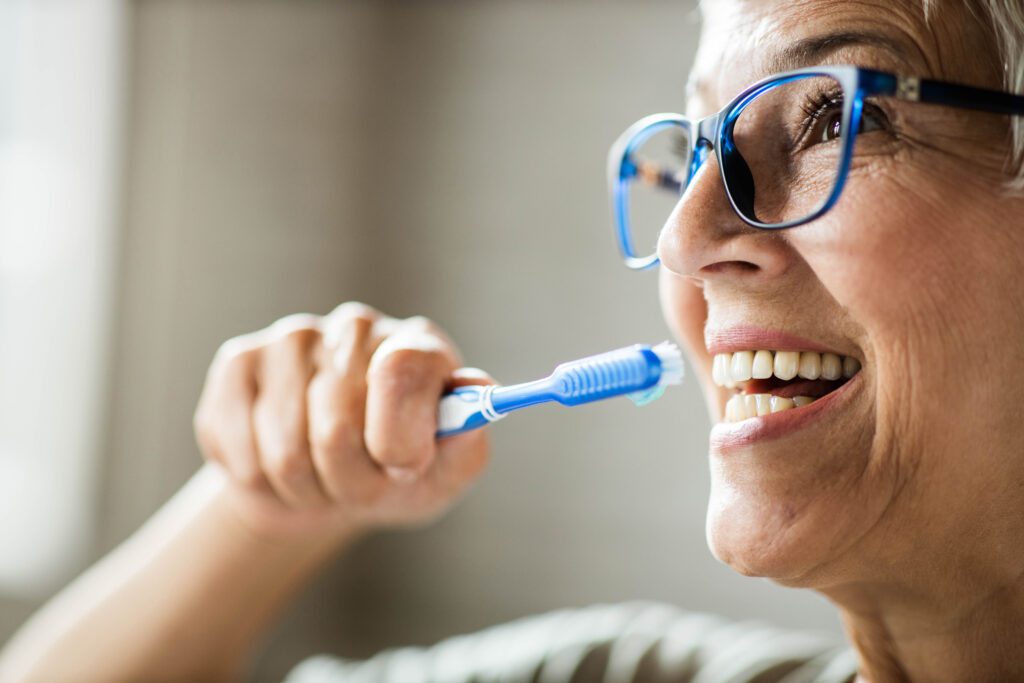Forever Smiles: Learn How Aging Can Affect Dental Health
A large part of the focus on dental health is aimed at dental health in our early years—getting the basics down, creating good oral hygiene habits, braces, and so on. No doubt, it’s important to start kids on the right foot with dental health so those good habits will carry on into adulthood. However, aging affects dental health in significant ways, as well. Take our quiz and see how aging can affect your oral health.
1. True or false? Studies have found that approximately 18% of adults older than 65 have untreated cavities and 68% have periodontitis.
2. Which systemic disease commonly found in seniors has been found to increase the occurrence and development of periodontitis, or gum disease, by 86%?
A. Diabetes
B. Arthritis
C. Dementia
D. Cancer
3. True or false? Certain prescription drugs can have an effect on oral health, and approximately 90% of adults older than 65 take at least one prescription medication a month with 30 percent taking eight or more on a daily basis.
4. Prescription and/or over-the-counter medications can lead to medication errors, drug interactions, or adverse drug reactions that can impact oral health. Which of the following are common medications that can cause issues with dental health?
A. Medications used to manage urinary frequency and incontinence, antidepressants, and diuretics can cause xerostomia — or dry mouth.
B. Calcium channel blockers (medications used to lower blood pressure), antiseizure drugs, and immunosuppressants can cause gingival overgrowth — or an overgrowth of gum tissue around the teeth — and gum inflammation.
C. NSAIDs like ibuprofen and aspirin, hypoglycemic agents, beta-blockers, and immunosuppressive agents can cause mucositis — or inflammation of the mucous membrane that lines the inside of the mouth, and ulcerated sores.
D. All of the above
5. True or false? Xerostomia, or dry mouth, which can lead to tooth and root cavities and sore gums and mouth, affects 30% of adults older than 65 and up to 40% of adults older than 80. It is usually a result of medications, but xerostomia can also be caused by diabetes, Alzheimer’s disease, or Parkinson’s disease.
6. Which of the following health conditions can make good oral health practices difficult for the elderly?
A, Dementia and Alzheimer’s disease
B. Adults with physical limitations or loss of mobility caused by conditions like osteoarthritis and rheumatoid arthritis
C. Adults with age-related visual impairment, such as cataracts, glaucoma, or presbyopia
D. All of the above
7. True or false? People with chronic diseases such as arthritis, diabetes, heart diseases, and chronic obstructive pulmonary disease (COPD) may be more likely to develop gum disease, also called periodontal disease, but they are less likely to get dental care than adults without these chronic conditions.
8. Which of the following is your best resource for discussing your concerns about your oral health?
A. The Internet
B. Friends and family
C. Your dentist
Compiled by ERIKA ALDRICH / Information provided by the American Dental Association, the Centers for Disease Control and Prevention, and the National Library of Medicine
ANSWERS:
True. Older adults can have a high rate of cavities, and they need to be concerned about periodontal disease, also called gum disease.
A. Diabetes. Both Type 1 and Type 2 diabetes can increase the risk of periodontal disease.
True. Medications can have an adverse effect on dental health.
D. All of the above
True. Dry mouth, whether caused by medication or a medical condition, has a negative effect on oral health.
D. All of the above
True
C. Your dentist. Discuss your oral health concerns, whether related to medications or medical conditions, with your dentist.
